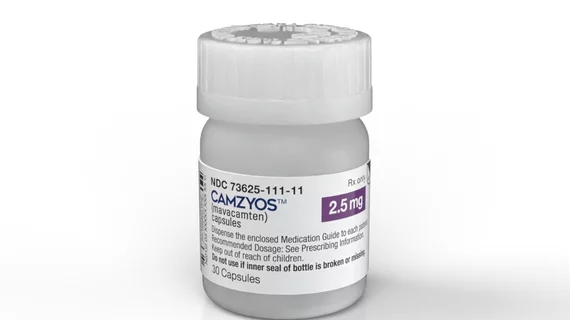FDA approves mavacamten for obstructive hypertrophic cardiomyopathy
The U.S. Food and Drug Administration (FDA) has approved mavacamten, sold by Bristol Myers Squibb (BMS) under the name Camzyos, for the treatment of adult patients with obstructive hypertrophic cardiomyopathy (HCM).
Mavacamten is an allosteric and reversible inhibitor selective for cardiac myosin. The FDA’s approval covers the treatment of symptomatic New York Heart Association (NYHA) class II and class III obstructive HCM.
“This is a first-in-class medicine specifically for patients living with symptomatic obstructive HCM,” Milind Desai, MD, MBA, director of the Hypertrophic Cardiomyopathy Center and director of clinical operations in Cleveland Clinic’s Heart Vascular & Thoracic Institute, said in a statement. “With this FDA approval, U.S. cardiologists now have a new pharmacological option for eligible patients that targets the underlying pathophysiology of the disease.”
Desai has years of experience with mavacamten. On the first day of ACC.22, for instance, he presented data on the medication’s ability to reduce the need for septal reduction therapy among obstructive HCM.
Samit Hirawat, MD, executive vice president and chief medical officer of Global Drug Development for BMS, also commented on the FDA’s decision.
“This approval builds on decades of cardiovascular leadership and reflects our steadfast commitment to people impacted by cardiovascular disease,” Hirawat said. “We are proud to bring this first-of-its kind medicine to patients, which may help to address an unmet need in the U.S. in the symptomatic NYHA class II-III obstructive HCM treatment landscape.”
The full U.S. prescribing information for mavacamten also includes a boxed warning highlighting a potential risk of heart failure.
“Camzyos reduces left ventricular ejection fraction (LVEF) and can cause heart failure due to systolic dysfunction,” according to BMS. “Echocardiogram assessments of LVEF are required prior to and during treatment with Camzyos. Initiation of Camzyos in patients with LVEF <55% is not recommended. Interrupt Camzyos if LVEF is <50% at any visit or if the patient experiences heart failure symptoms or worsening clinical status.”
The full warning is available here.
A bit of background on mavacamten
The FDA’s approval was largely based on data from the EXPLORER-HCM trial, which showed that mavacamten was superior to a placebo for treating obstructive HCM and associated with no significant long-term, treatment-related adverse events. Also, cardiac MRI scans confirmed the medication was associated with “favorable remodeling” compared to a placebo. Long-term findings from this trial were shared with attendees at ACC.22.
In October 2021, BMS acquired Myocardia, mavacamten’s manufacturer at the time, for $13.1 billion. Thirteen months later, the FDA announced it needed more time to review data on mavacamten before making a final decision on approval.
Also, back in February, Cleveland Clinic listed mavacamten as one its 10 medical innovations expected to make a big impact on patient care on 2022.
Related Cardiomyopathy Content:
U.S. expected to see large rise in cardiomyopathy cases over next decade
AI-powered ECG analysis could boost care for patients with hypertrophic cardiomyopathy
Metoprolol demonstrates value as a treatment for obstructive hypertrophic cardiomyopathy
Diabetes with cardiomyopathy associated with heightened heart failure risk
‘Surprising’ trends in ICD use among HCM patients
Combined genetic testing for cardiomyopathies and arrhythmias yields positive results
COVID-19 leads to sharp rise in stress cardiomyopathy
LAA occlusion reduces stroke risk among patients with HCM and AFib
MRI detects heart failure risk in patients with dilated cardiomyopathy

